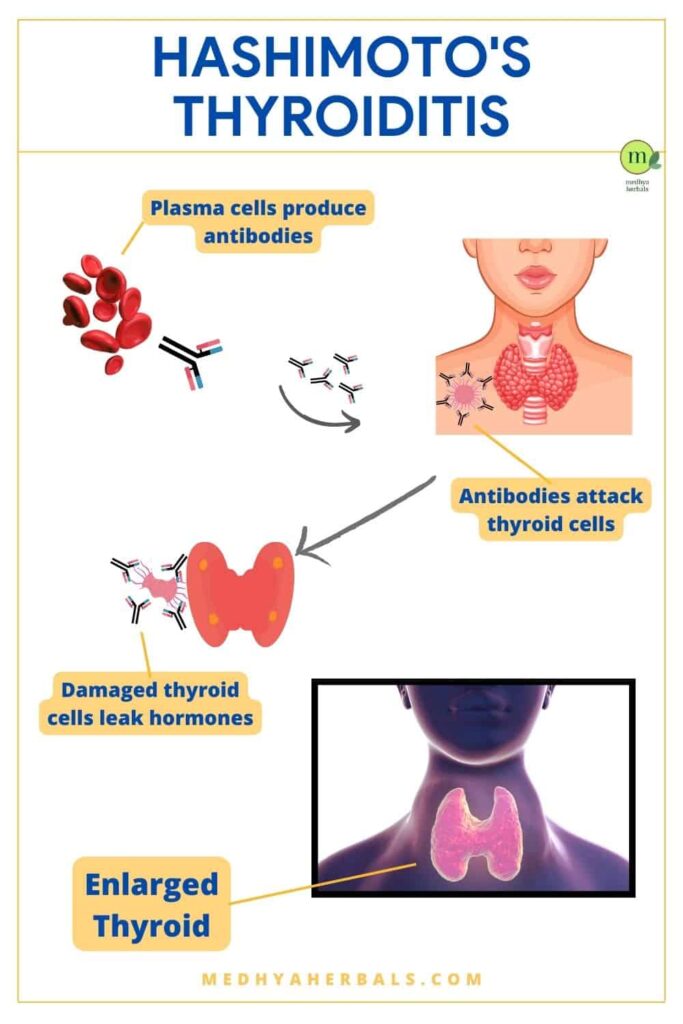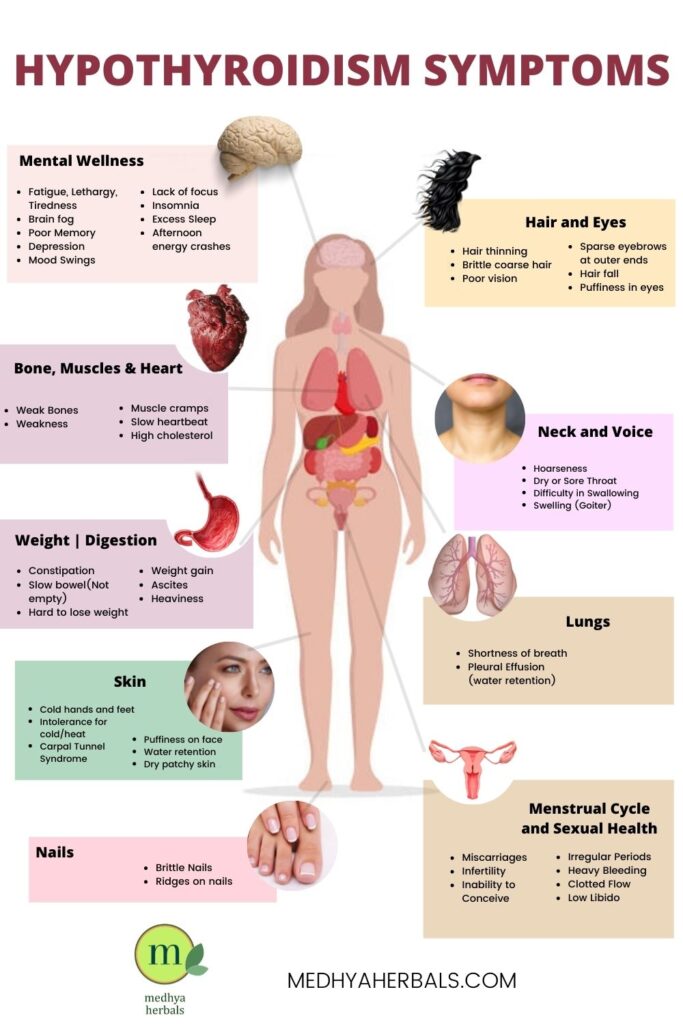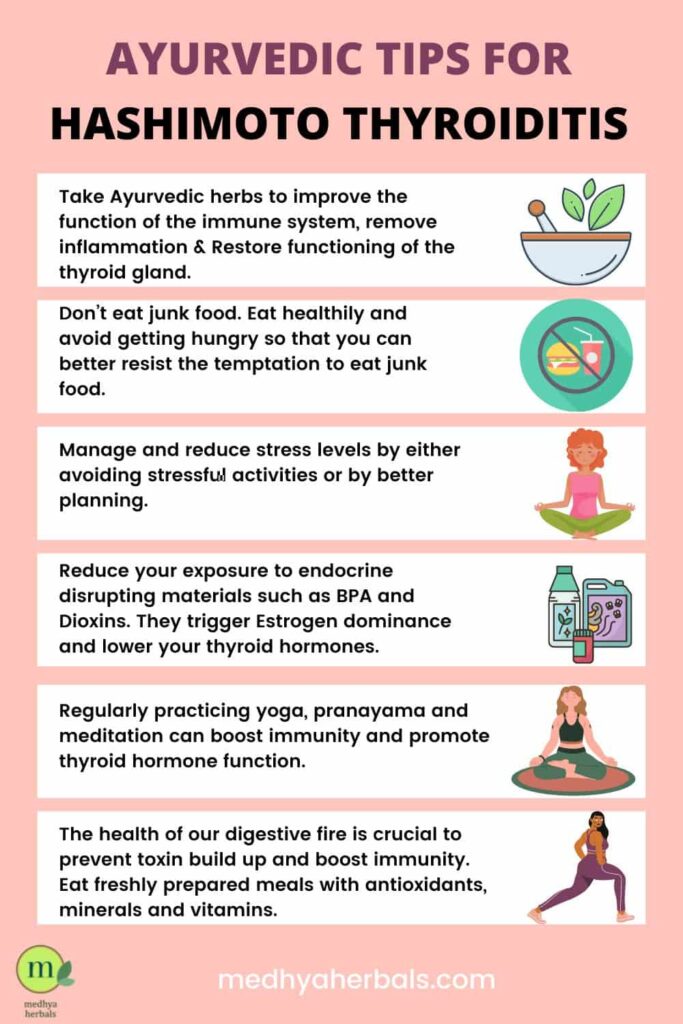Thyroid disorders, particularly Hashimoto’s and hypothyroidism, have long been subjects of concern in the realm of women’s health. The thyroid, a butterfly-shaped gland nestled in our neck, plays a pivotal role in our body’s metabolic functions. When it falters, the ripple effect can be profound. Imagine feeling perpetually drained, battling unexplained weight changes, or grappling with mood swings — these are but a few of the symptoms that thousands face daily. Yet, there remains confusion: what exactly is the difference between Hashimoto’s disease and hypothyroidism? Why does it matter?
At Medhya Herbals, with our deep roots in Ayurvedic natural treatments, we’ve delved into the nuances of these thyroid disorders to unravel the facts for you. This article promises not just clarity, but also insights into managing and possibly reversing these conditions. So, if you’ve ever found yourself asking questions about thyroid health or merely curious, read on. Today, we illuminate the path to understanding, one fact at a time.
Understanding the Thyroid: A Primer
The thyroid is a small, butterfly-shaped gland located at the base of the neck. While it might be small in size, its impact on the body is immense. This gland is responsible for producing thyroid hormones, primarily thyroxine (T4) and triiodothyronine (T3). These hormones regulate a myriad of bodily functions, from our metabolism and body temperature to heart rate and even the way our muscles contract. In essence, the thyroid ensures our body’s energy usage is optimized, affecting how we feel and function on a daily basis.
TSH: The Thyroid’s Regulatory Powerhouse
TSH, or Thyroid Stimulating Hormone, is produced by the pituitary gland in the brain. Its primary role? To regulate the production of thyroid hormones by the thyroid gland. Think of TSH as the body’s thermostat for thyroid activity. When the body senses low thyroid hormone levels, the pituitary gland releases more TSH, signaling the thyroid to produce and release more hormones. Conversely, if there’s an abundance of thyroid hormones, the pituitary reduces TSH production, instructing the thyroid to slow down.
Balancing this TSH level is crucial for overall thyroid health. Abnormalities can often hint at underlying disorders, be it Hashimoto’s, hypothyroidism, or other thyroid-related conditions. Monitoring TSH levels, therefore, becomes an essential component in diagnosing and managing thyroid health effectively.

Hashimoto’s Disease vs Hypothyroidism: Understanding the Differences
The terms “Hashimoto’s disease” and “hypothyroidism” are often used interchangeably, leading to confusion. While they are closely related, they are distinct conditions. Distinguishing between them is essential for understanding the nature of each disorder, its causes, and its treatment.
Hypothyroidism: A State of Hormone Deficiency
Hypothyroidism, often referred to as an underactive thyroid, occurs when the thyroid gland doesn’t produce enough thyroid hormones to meet the body’s needs. These hormones, namely T3 and T4, play a pivotal role in regulating metabolic processes throughout the body. When these are in short supply, it can slow down many of the body’s functions, leading to a range of symptoms.
Causes
While Hashimoto’s disease is the most common cause of hypothyroidism, there are several other potential causes, including:
- Thyroid surgery, where a portion or all of the thyroid is removed.
- Radiation treatments, especially in cancers of the head and neck.
- Certain medications that affect thyroid hormone production.
- Congenital conditions where babies are born with a dysfunctional thyroid.

Symptoms of Hypothyroidism
The manifestations of hypothyroidism can be subtle and gradual, often mistaken for the natural aging process or other health conditions. Common symptoms include:
- Fatigue and general weakness
- Unexplained weight gain or difficulty losing weight
- Dry skin and brittle nails
- Hair thinning or loss
- Sensitivity to cold
- Constipation
- Muscle aches and tenderness
- Joint pain or stiffness
- Depression or mood swings
- Impaired memory
- Irregular or heavier menstrual periods
It’s worth noting that the severity and combination of these symptoms can vary widely among individuals.
Hashimoto’s Thyroiditis
Hashimoto’s thyroiditis, often simply referred to as Hashimoto’s, is an autoimmune disorder where the immune system mistakenly targets and attacks the thyroid gland. This assault damages the thyroid, limiting its ability to produce the essential hormones the body requires.
The exact cause of Hashimoto’s remains unknown, but genetic predisposition, environmental triggers, and hormonal changes (like pregnancy) are believed to play roles. The presence of certain antibodies in the blood, specifically Thyroid Peroxidase (TPO) antibodies and Thyroglobulin antibodies, is a hallmark of Hashimoto’s.
Symptoms Peculiar to Hashimoto’s Thyroiditis
In the early stages, Hashimoto’s may not present noticeable symptoms. However, as the disease progresses and the thyroid’s function diminishes, symptoms of hypothyroidism can emerge. Hashimoto’s can also lead to an enlarged thyroid (goiter) and, in some cases, transient periods of hyperthyroid symptoms before the thyroid becomes underactive.
While many symptoms of Hashimoto’s Thyroiditis overlap with general hypothyroidism, some manifestations are particularly associated with this autoimmune condition:
- Enlarged thyroid (Goiter): A noticeable swelling at the base of the neck, which might cause discomfort or difficulty swallowing.
- Thyroid nodules: Lumps or growths in the thyroid gland.
- Increased vulnerability to other autoimmune diseases: Such as vitiligo, rheumatoid arthritis, or type 1 diabetes.
- Fluctuating thyroid function: Individuals with Hashimoto’s might experience periods of overactive thyroid (or hyperthyroidism) before the gland becomes underactive.
Distinguishing Between the Two
- Nature: Hashimoto’s is an autoimmune condition, while hypothyroidism is a state of thyroid hormone deficiency.
- Cause vs. Outcome: Hashimoto’s is a cause of hypothyroidism. In other words, someone with Hashimoto’s might develop hypothyroidism, but not everyone with hypothyroidism has Hashimoto’s.
- Diagnosis: While elevated TSH levels can indicate hypothyroidism, the presence of specific antibodies is required to diagnose Hashimoto’s.
Diagnosis of Hashimoto’s Disease
Elevated TSH levels can suggest an underactive thyroid, often resulting from Hashimoto’s. However, a definitive diagnosis of Hashimoto’s requires the presence of specific antibodies: Thyroid Peroxidase (TPO) antibodies and Thyroglobulin antibodies.
In the early stages of Hashimoto’s, TSH levels can remain within the normal range, even as the immune system attacks the thyroid. Over time, as the gland’s function diminishes, TSH levels typically rise, indicating an underactive thyroid. Thus, while high TSH may hint at Hashimoto’s, antibody tests confirm it.
Difficulties in Diagnosis of Hashimoto’s Disease
The symptoms of Hashimoto’s often emerge gradually and can be vague, mimicking other conditions, leading to potential misdiagnoses. Chronic fatigue syndrome, fibromyalgia, and depression can present with similar fatigue, muscle aches, and mood disturbances.
Additionally, other thyroid disorders, such as Graves’ disease, might have overlapping symptoms. Adrenal fatigue and certain nutritional deficiencies, like vitamin B12 or iron deficiency, can also manifest with symptoms resembling those of Hashimoto’s. Given this overlap, a thorough medical evaluation, including specific antibody tests, is crucial for an accurate diagnosis of Hashimoto’s thyroiditis.
Difficulties in Diagnosis of Hypothyroidism
Hypothyroidism’s broad symptom range, from fatigue and weight gain to mood changes and hair loss, overlaps with many other conditions. Without specific tests or a high index of suspicion, it’s easy for physicians to attribute these symptoms to other causes, such as stress, aging, or other medical conditions. Additionally, the reliance solely on TSH levels without considering clinical symptoms or other potential markers can sometimes result in missed diagnoses.

Healing Thyroid Disorders with Ayurveda
Ayurveda, an ancient holistic healing system originating from India, offers profound insights and treatments for a myriad of health conditions, including thyroid disorders. By focusing on the balance of energies and the root causes of ailments, Ayurveda presents both preventive and curative measures for thyroid-related issues.
The Ayurvedic Perspective on Thyroid Disorders
In Ayurveda, the body’s health is governed by three primary energies or doshas: Vata, Pitta, and Kapha. Thyroid disorders, particularly hypothyroidism, are often associated with an imbalance in these doshas, predominantly a combination of elevated Kapha (leading to sluggishness) and disturbed Vata (resulting in dryness and coldness).
Ayurveda attributes thyroid imbalances to factors such as poor diet, lack of exercise, unresolved emotional issues, and chronic stress. These factors disturb the doshic balance, leading to disruptions in the body’s metabolic functions and energy regulation.
Ayurvedic Approaches to Managing Thyroid Disorders
Herbal Remedies
- Ashwagandha (Withania somnifera): Known as an adaptogen, Ashwagandha helps modulate stress responses and supports thyroid function.
- Guggul (Commiphora mukul): This resin has properties that can stimulate thyroid activity and enhance metabolism.
- Kanchanar (Bauhinia variegata): Traditionally used to treat goiter, Kanchanar can help balance thyroid hormone production.
Dietary Recommendations
- Iodine-rich foods: Incorporating foods like seaweed, fish, and dairy can naturally boost iodine levels, vital for thyroid function.
- Anti-inflammatory foods: Turmeric, ginger, and flaxseeds can help reduce inflammation and support overall health.
- Avoiding goitrogens: Foods like cabbage, broccoli, and cauliflower, when consumed raw, can interfere with thyroid hormone production. Cooking can neutralize this effect.
Lifestyle Practices
- Yoga and Pranayama: Specific asanas (postures) and breathing exercises can stimulate the thyroid gland and improve its function.
- Abhyanga (Oil Massage): Regular self-massage with warm sesame oil can balance Vata and improve circulation.
- Meditation: Regular meditation practices can mitigate stress, a significant factor in thyroid imbalances.
Conclusion
Navigating the complexities of thyroid disorders, especially Hashimoto’s, can often feel overwhelming. The myriad of symptoms and the uncertainty surrounding treatment options can make the journey to relief challenging. But there’s hope. Ayurveda, with its holistic and root-cause approach, offers a pathway that not only addresses the symptoms but also the underlying imbalances that give rise to them.
At Medhya Herbals, we understand the intricacies of such conditions and the profound impact they can have on one’s daily life. Our dedicated Ayurvedic doctors are here to guide you, offering personalized treatment plans tailored to your unique needs. By delving deep into the cause, rather than just alleviating symptoms, Ayurvedic treatments aim to provide lasting relief.
If you’ve been searching for a solution, consider taking that next step towards healing. Schedule a consultation with our Ayurvedic experts at Medhya Herbals. Let’s embark on this journey to wellness together, ensuring you receive the care and support you truly deserve.
FAQ
Can stress affect Hashimoto’s?
Yes, stress can indeed affect Hashimoto’s. Chronic stress is known to impact the immune system, potentially exacerbating autoimmune reactions like those seen in Hashimoto’s disease. When the body is under prolonged stress, it releases cortisol, a hormone that can interfere with thyroid function and hormone balance. Additionally, stress might worsen the symptoms of Hashimoto’s, making them more pronounced and challenging to manage. It’s essential for individuals with Hashimoto’s to find effective stress-reducing strategies to support their overall well-being and thyroid health.
Is all hypothyroid Hashimoto?
No, not all cases of hypothyroidism are caused by Hashimoto’s disease. While Hashimoto’s is the most common cause of hypothyroidism, there are several other reasons one might develop an underactive thyroid. These include thyroid surgery, radiation therapy to the neck, certain medications, iodine deficiency, and damage to the pituitary gland. Thus, while many cases of hypothyroidism stem from Hashimoto’s, it’s essential to recognize that hypothyroidism can arise from a variety of underlying causes.
Can you have Hashimoto’s without hypothyroidism?
Yes, it’s possible to have Hashimoto’s without manifesting hypothyroidism, especially in the early stages of the disease. Hashimoto’s thyroiditis is an autoimmune condition where the immune system attacks the thyroid gland. In its initial phases, despite this immune assault, the thyroid might still be able to produce adequate levels of hormones, thus not leading to hypothyroidism. However, as the disease progresses and the thyroid sustains more damage, it often results in reduced hormone production, eventually leading to hypothyroidism. Regular monitoring is essential, as the transition from Hashimoto’s to hypothyroidism can occur over time.
Can you heal Hashimoto’s without medication?
While conventional medicine often prescribes medication for Hashimoto’s, Ayurveda offers alternative holistic approaches to manage and potentially alleviate its symptoms. Ayurvedic treatments focus on balancing the body’s energies, or doshas, through dietary changes, herbal remedies, and lifestyle practices. Specific herbs like Ashwagandha support thyroid function and combat stress, while dietary recommendations emphasize foods that reduce inflammation and boost immunity. While Ayurvedic treatments can provide significant relief, it’s crucial to work closely with healthcare professionals, as each individual’s needs can vary, and combining both traditional and Ayurvedic approaches might be beneficial for some.
Can you live a normal life with Hashimoto’s?
Absolutely. While Hashimoto’s presents its challenges, many individuals find ways to lead fulfilling, active lives despite the diagnosis. With appropriate medical management, lifestyle adjustments, and support, the symptoms of Hashimoto’s can be effectively managed. Being proactive in one’s healthcare, staying informed, and adopting beneficial lifestyle habits can significantly mitigate the disorder’s impact. With the right care and strategies, individuals with Hashimoto’s can pursue their passions, maintain their relationships, and enjoy a quality of life comparable to those without the condition.
Does Hashimoto’s make you tired?
Yes, fatigue is a hallmark symptom of Hashimoto’s disease. Individuals with Hashimoto’s often experience a profound sense of exhaustion that isn’t alleviated by rest or sleep. This fatigue goes beyond typical tiredness; it’s a deep-seated weariness that can impact daily activities, work, and overall quality of life. The tiredness stems from the reduced thyroid hormone production associated with Hashimoto’s, which slows down the body’s metabolic processes, leading to feelings of constant fatigue and lethargy.
What does a Hashimoto’s flare feel like?
A Hashimoto’s flare is a period when the symptoms of the disease intensify, often suddenly. During a flare, individuals might experience heightened fatigue, joint and muscle pain, mood swings, and increased sensitivity to cold. Some may also encounter “brain fog,” characterized by difficulties in concentration and memory. These exacerbations can feel like a sudden wave of illness, making daily tasks and activities challenging. The duration and severity of flares can vary among individuals, and they can be triggered by various factors such as stress, infections, or even dietary choices.
Can you eat rice with Hashimoto’s?
Yes, rice is generally safe for those with Hashimoto’s. However, it’s essential to opt for whole grains like brown rice over refined versions. Brown rice retains its nutrient-rich bran and germ, offering more fiber, vitamins, and minerals. However, as with any food, it’s crucial to monitor one’s body’s response and consult with a nutritionist or doctor if unsure.
Is coffee bad for Hashimoto’s?
Coffee in moderation is typically okay for those with Hashimoto’s, but timing matters. Consuming coffee too close to taking thyroid medication can reduce its absorption, making the medication less effective. It’s recommended to wait at least an hour after taking thyroid meds before having coffee. Additionally, some individuals might find that coffee exacerbates their symptoms, so it’s essential to pay attention to the body’s signals.
What foods heal Hashimoto’s?
While no single food can “cure” Hashimoto’s, certain dietary choices can support thyroid function and reduce inflammation, which is often present with autoimmune disorders. Foods beneficial for Hashimoto’s include:
Selenium-rich foods: Such as Brazil nuts, seafood, and eggs. Selenium supports thyroid function and reduces inflammation.
Anti-inflammatory foods: Like fatty fish (salmon, mackerel), berries, and turmeric.
Iodine-rich foods: In moderation, like seaweed, fish, and dairy. However, excessive iodine can worsen symptoms, so it’s essential to find a balance.
Fiber-rich foods: Whole grains, fruits, and vegetables can support digestion and reduce constipation, a common symptom of hypothyroidism.
References
- Hashimoto’s disease. (2021).
https://www.niddk.nih.gov/health-information/endocrine-diseases/hashimotos-disease - Mincer DL, et al. (2022). Hashimoto thyroiditis.
https://www.ncbi.nlm.nih.gov/books/NBK459262/

